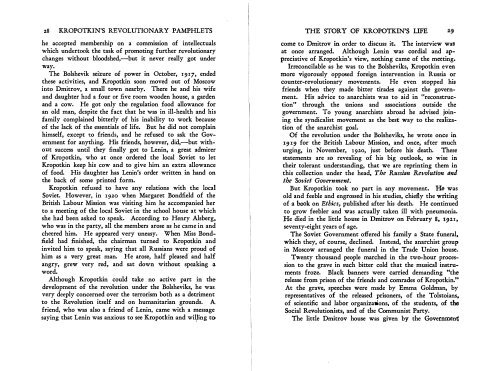Kropotkin's Revolutionary Pamphlets - Libcom
Kropotkin's Revolutionary Pamphlets - Libcom
Kropotkin's Revolutionary Pamphlets - Libcom
You also want an ePaper? Increase the reach of your titles
YUMPU automatically turns print PDFs into web optimized ePapers that Google loves.
28 KROPOTKIN'S REVOLUTIONARY PAMPHLETS<br />
he accepted membership on a commission of intellectuals<br />
which undertook the task of promoting further revolutionary<br />
changes without bloodshed,-but it never really got under<br />
way.<br />
The Bolshevik seizure of power in October, 1917, ended<br />
these activities, and Kropotkin soon moved out of Moscow<br />
into Dmitrov, a small town nearby. There he and his wife<br />
and daughter had a four or five room wooden house, a garden<br />
and a cow. He got only the regulation food allowance for<br />
an old man, despite the fact that he was in ill-health and his<br />
family complained bitterly of his inability to work because<br />
of the lack of the essentials of life. But he did not complain<br />
himself, except to friends, and he refused to ask the Government<br />
for anything. His friends, however, did,-but without<br />
success until they finally got to Lenin, a great admirer<br />
of Kropotkin, who at once ordered the local Soviet to let<br />
Kropotkin keep his cow and to give him an extra allowance<br />
of food. His daughter has Lenin's order written in hand on<br />
the back of some printed form.<br />
Kropotkin refused to have any relations with the local<br />
Soviet. However, in 1920 when Margaret Bondfield of the<br />
British Labour Mission was visiting him he accompanied her<br />
to a meeting of the local Soviet in the school house at which<br />
she had been asked to speak. According to Henry Alsberg.<br />
who was in the party, all the members arose as he came in and<br />
cheered him. He appeared very uneasy. When Miss Bondfield<br />
had finished, the chairman turned to Kropotkin and<br />
invited him to speak, saying that all Russians were proud of<br />
him as a very great man. He arose, half pleased and half<br />
angry, grew very red, and sat down without speaking a<br />
word.<br />
Although Kropotkin could take no active part in the<br />
development of the revolution under the Bolsheviks, he was,<br />
very deeply concerned over the terrorism both as a detriment<br />
to the Revolution itself and on humanitarian grounds. A<br />
friend, who was also a friend of Lenin, came with a message<br />
saying that Lenin was anxious to see Kropotkin and wilpng too<br />
THE STORY OF KROPOTKIN'S LIFE<br />
come to Dmitrov in order to discuss it. The interview was<br />
at once arranged. Although Lenin was cordial and appreciative<br />
of <strong>Kropotkin's</strong> view, nothing came of the meeting.<br />
Irreconcilable as he was to the Bolsheviks, Kropotkin even<br />
more vigorously opposed foreign intervention in Russia <br />
r<br />
counter-revolutionary movements. He even stopped hiS<br />
friends when they made bitter tirades against the government.<br />
His advice to anarchists was to aid in "reconstruction"<br />
through the unions and associations outside the<br />
government. To young anarchists abroad he advised jining<br />
the syndicalist movement as the best way to the reahzation<br />
of the anarchist goal.<br />
Of the revolution under the Bolsheviks, he wrote once in<br />
19 I 9 for the British Labour Mission, and once, after much<br />
urging, in November, 19.10, just before his death. These<br />
statements are sO revealing of his big outlook, so wise in<br />
their tolerant understanding, that we are reprinting them in<br />
this collection under the head, The Russian Revolution and<br />
the Soviet Government.<br />
But Kropotkin took no part in any movement. He was<br />
old and feeble and engrossed in his studies, chiefly the writing<br />
of a book on Ethics, published after his death. He continued<br />
to grow feebler and was actually taken ill with pneumonia.<br />
He died in the little house in Dmitrov on February 8, 19%1,<br />
seventy-eight years of age.<br />
The Soviet Government offered his family a State funeral.<br />
which they, of course, declined. Instead, the anarchist group<br />
in Moscow arranged the funeral in the Trade Union house.<br />
Twenty thousand people marched in the two-hour procession<br />
to the grave in such bitter cold that the musical instruments<br />
froze. Black banners were carried demanding "the<br />
release from prison of the friends and comrades of Kropotkin!'<br />
At the grave, speeches were made by Emma Goldman, by<br />
representatives of the released prisoners. of the T olstoians.<br />
of scientific and labor organizations. of the students, of the<br />
Social Revolutionists. and of the Communist Party.<br />
The little Dmitrov house was given by the Government;

















